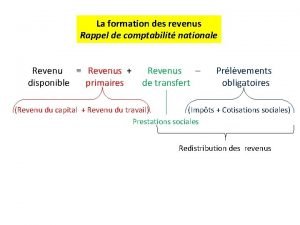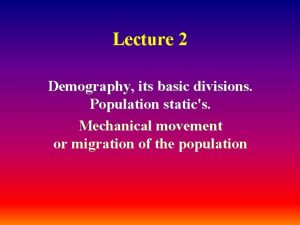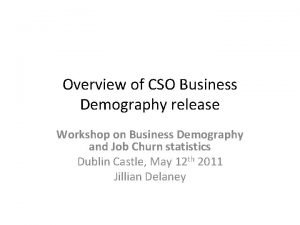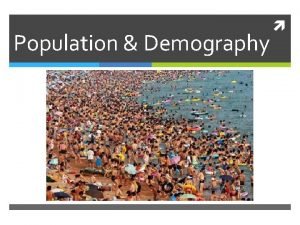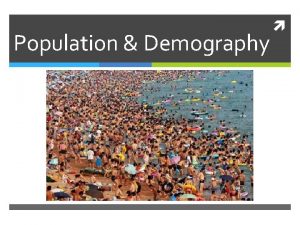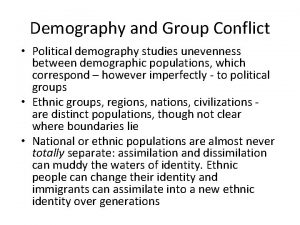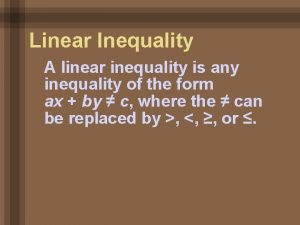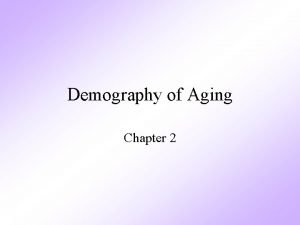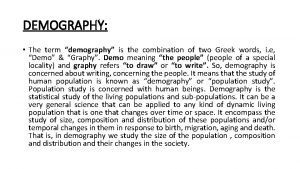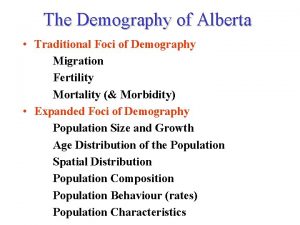The Political Demography of Inequality The Piketty Thesis






























- Slides: 30

The Political Demography of Inequality The Piketty Thesis

Political Demography • Recall: Interactions; 2 nd or 3 rd order effects • Can have 4 th order effects: Demography Economic Growth Inequality Conflict • Interaction between population stagnation, political calm, and low inflation


Research Base for the book • Economic history rather than presentist economics • Long time horizon needed, late 18 th c until now • Key is drawing on pre-1914 work, which is distinctive • Tax records • Inheritance records • Estate valuation records • Rich lists

What is Capital? • Anything which generates income: o Stocks and bonds o Bank accounts o Physical plant and machinery o Home • Line between income, consumption goods and capital is unclear and socially defined: car? Ipad? education?

Piketty’s Thesis in 3 Minutes • https: //www. youtube. com/watch? v=HLYUTFqtu. I

Iron law of r > g Capital accumulates Rate of return on capital (r) Solution: = Income stagnates Exceeds growth of income (g)

What does this have to do with demography? Population growth = income growth = less inequality Inequality = rate of return on capital (r) – growth rate of income (g) Aging population slows growth rate of income (g) This increases r > g. In other words, rents accrue to houses and hotels while income from labour is stuck at $200 per round! So capital (money, properties, houses and hotels) will be more unevenly distributed between players than wealth “Rentiers” vs Earners; Rents v Income

Economic output Resources Labour Capital + + Technology

Economic (Income) Growth More Resources More Labour More Capital + + Better Technology

Piketty’s Political Demography of Inequality • Capital is less equally distributed than income. Capital produces returns (r), different from income growth (g) • Stagnant population (ie. labour) growth = lower economic growth (g) • Lower economic growth (g) makes capital more important (r-g) • When capital more important (r-g), more inequality • More inequality = political tension and violence


Capital-Dominated Societies • Inheritance not income is what counts • Stable capital income • Low inflation • Few wars • In Sense and Sensibility, ’John has just inherited the vast Norland estate, which brings in £ 4000 a year (100 x average British income)…this is contrasted with the comparative poverty of his half-sisters, Elinor, Marianne, and Margaret (4 x avg income)

US v Europe • US had immigration and population growth • Income of new people an important share of national econ. growth • Europe a more stagnant population • Capital more important part of national economic growth

Pre-1914 Inequality • Balzac, Jane Austen, Henry James 19 th c novels • Rastingnac: cannot hope to earn as much as a lawyer as if married into wealth. Even if he made it, would have just 10 x average wealth • Needed to be in the 1% to be secure: 20 x, 50 x, 100 x richer than average, from late 18 th c-early 20 th c

Capital Destroyed, Inequality Reset • ‘The suicides by skyscraper leaps began…Einhorn was among the first to be wiped out…he lost his legacy…at the finish he had nothing but vacant lots…of these several went for taxes…when I sometimes took him for a ride he’d say, “We used to have that block of stores…. ”’ – Saul Bellow, The Adventures of Augie March, p. 106

Wars and Depression • War destroys capital • Invaders expropriate • Wealth taxed by state to fund war effort • Depression wipes out value • Inflation devalues capital • Political instability, little trade

Postwar Economic Boom, 1945 -73 Baby boom Expanding education End of gold standard Freer trade Pent up demand leads to growth • GDP per head (income) rises rapidly • This reduces r – g, lowering inequality • • •

Post-1973: Back to Normal Income more unequal, BUT, the key is: • Capital accumulates • Capital Share of income rises back to previous levels

US had low inequality, was less affected by war

Inheritance and Fertility Rates

The Return of Inheritance


Endgame • Risk of a spiral (p 572) of capital accumulation generating rents, much of which is saved as capital, fuelling a vicious circle • But unlike Marx, Piketty envisions a floor to the process

Political Risk? • "In France, it's very striking to see that in 1920, the political majorities adopted steeply progressive taxation. Exactly the same people refused the income tax in 1914 with a 2 percent tax rate. And in between, the Bolshevik revolution made them feel, after all, that progressive taxation is not so dangerous as revolution. “ Piketty, 1 May 2014, Huffington Post

Solution • Piketty argues for wealth tax rather than income tax • Global capital tax • Inheritance tax • Property tax • Accepts it is politically difficult • Inflation may be good – especially for Eurozone debtors

Critique I: The role of Labour • Marx believed in the Falling Rate of Profit thesis, that capitalists needed more labour. More capital would chase available labour, driving down rate of return (r) • Piketty: more capital does not drive down rate of return

Economists’ critique • Economists like Larry Summers, like Marx, say more capital means lower rate of return, also higher economic growth (g) drives up rates of return (r) • More capital, more depreciation costs. Ignored by Piketty • Piketty replies that rate of return (r) fairly consistent and independent of growth and capital accumulation • Many economists disagree, suggesting capital and income are connected

Land prices in cities • Rognlie argues that much of what has occurred post-73 is to do with soaring land rents, not corporate capital gains. Cities have seen a big revival (London, San Franciso, New York…. )

Goodhart’s Critique • High fertility and globalisation boosted supply of labour, lowering wages and boosting rents and profits. Golden age of capital. • As young workers become scarce, they will be able to command higher wages • Spending on health care will burst budgets, leading to inflation, which weakens capital value • "We are on the cusp of a complete reversal. Labour will be in increasingly short supply. Companies have been making pots of money but life isn't going to be so cosy for them anymore, " said Prof Goodhart.
 Piketty thomas
Piketty thomas Components of demography
Components of demography Demography ap human geography
Demography ap human geography Deforestation antonym
Deforestation antonym Static demography
Static demography Demographic data definition
Demographic data definition Cso business demography
Cso business demography Sources of demography ppt
Sources of demography ppt Elements of demography
Elements of demography Lesson 1-6 compound inequalities
Lesson 1-6 compound inequalities Apush thesis examples
Apush thesis examples Chó sói
Chó sói Thiếu nhi thế giới liên hoan
Thiếu nhi thế giới liên hoan Số nguyên tố là
Số nguyên tố là Tỉ lệ cơ thể trẻ em
Tỉ lệ cơ thể trẻ em Tia chieu sa te
Tia chieu sa te Các châu lục và đại dương trên thế giới
Các châu lục và đại dương trên thế giới Thế nào là hệ số cao nhất
Thế nào là hệ số cao nhất Sơ đồ cơ thể người
Sơ đồ cơ thể người Tư thế ngồi viết
Tư thế ngồi viết Hình ảnh bộ gõ cơ thể búng tay
Hình ảnh bộ gõ cơ thể búng tay đặc điểm cơ thể của người tối cổ
đặc điểm cơ thể của người tối cổ Cách giải mật thư tọa độ
Cách giải mật thư tọa độ Tư thế worm breton là gì
Tư thế worm breton là gì ưu thế lai là gì
ưu thế lai là gì Tư thế ngồi viết
Tư thế ngồi viết Thẻ vin
Thẻ vin Thơ thất ngôn tứ tuyệt đường luật
Thơ thất ngôn tứ tuyệt đường luật Cái miệng bé xinh thế chỉ nói điều hay thôi
Cái miệng bé xinh thế chỉ nói điều hay thôi Các châu lục và đại dương trên thế giới
Các châu lục và đại dương trên thế giới Từ ngữ thể hiện lòng nhân hậu
Từ ngữ thể hiện lòng nhân hậu
